The global tetra-peptide anti-wrinkle solutions market is projected to grow from USD 1,752.3 million in 2025 to approximately USD 5,741.1 million by 2035, recording an absolute increase of USD 4,002.5 million over the forecast period. This translates into a total growth of 228.6%, with the market forecast to expand at a compound annual growth rate (CAGR) of 12.6% between 2025 and 2035. The overall market size is expected to grow by nearly 3.28X during the same period, supported by the rising adoption of advanced peptide technologies and increasing demand for effective anti-aging skincare solutions.
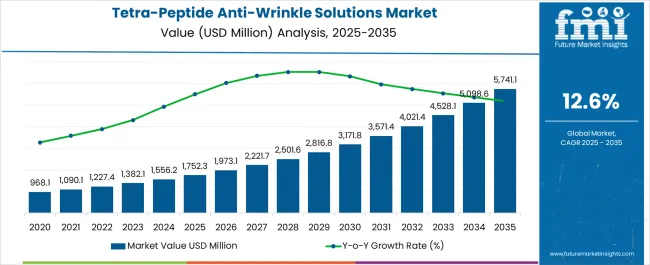
Between 2025 and 2030, the tetra-peptide anti-wrinkle solutions market is projected to expand from USD 1,752.3 million to USD 3,175.2 million, resulting in a value increase of USD 1,424.3 million, which represents 35.6% of the total forecast growth for the decade. This phase of growth will be shaped by rising consumer awareness about peptide-based skincare benefits, increasing penetration of premium skincare products in emerging markets, and growing adoption of clinical-grade formulations. Beauty brands are expanding their peptide portfolios to address the growing demand for scientifically-proven anti-aging solutions.
From 2030 to 2035, the market is forecast to grow from USD 3,175.2 million to USD 5,741.1 million, adding another USD 2,578.2 million, which constitutes 64.4% of the overall ten-year expansion. This period is expected to be characterized by expansion of personalized skincare solutions, integration of advanced delivery systems, and development of next-generation tetra-peptide formulations. The growing adoption of clean-label and vegan formulations will drive demand for innovative peptide technologies and specialized ingredient sourcing.
Between 2020 and 2025, the tetra-peptide anti-wrinkle solutions market experienced robust expansion, driven by increasing consumer focus on preventive skincare, growing influence of social media beauty trends, and rising disposable income in key markets. The market developed as beauty brands recognized the efficacy of peptide technologies in addressing aging concerns and began incorporating advanced formulations into mainstream product lines. Dermatologists and skincare professionals began emphasizing peptide-based treatments as effective alternatives to invasive procedures.
| Metric | Value |
|---|---|
| Estimated Value in (2025E) | USD 1,752.3 million |
| Forecast Value in (2035F) | USD 5,741.1 million |
| Forecast CAGR (2025 to 2035) | 12.6% |
Market expansion is being supported by the rapid increase in aging population worldwide and the corresponding demand for effective anti-aging skincare solutions that deliver visible results. Modern consumers are seeking scientifically-backed ingredients with proven efficacy, driving preference for peptide-based formulations over traditional anti-aging compounds. The growing awareness of preventive skincare among younger demographics is expanding the target consumer base beyond traditional mature age groups.
The increasing focus on ingredient transparency and clean beauty formulations is driving innovation in peptide delivery systems and sustainable sourcing practices. Social media influence and beauty education platforms are creating greater awareness about peptide benefits and proper skincare routines. Rising disposable income in emerging markets and growing premium skincare adoption are expanding global market opportunities for specialized peptide formulations.
The market is segmented by function, peptide type, product type, distribution channel, claim, and region. By function, the market is divided into anti-aging & wrinkle reduction, skin tightening, barrier strengthening, and moisture retention. Based on peptide type, the market is categorized into signal peptides, carrier peptides, neuropeptide analogues, and enzyme-inhibiting peptides. In terms of product type, the market is segmented into serums, creams, ampoules, and masks. By distribution channel, the market is classified into e-commerce, dermatology clinics, pharmacies, and specialty beauty retail. By claim, the market is divided into clinical-grade, dermatologist-tested, clean-label, and vegan. Regionally, the market is divided into North America, Europe, East Asia, South Asia & Pacific, Latin America, and Middle East & Africa.
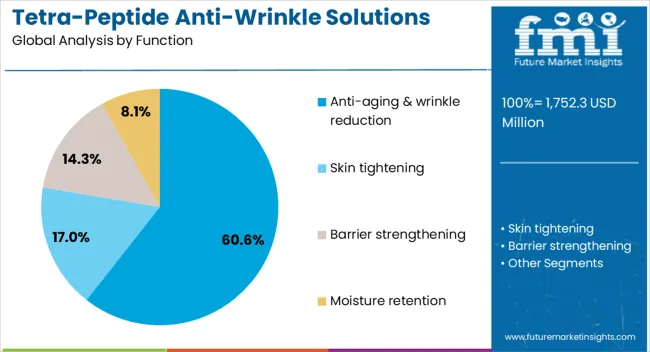
The anti-aging & wrinkle reduction function is projected to account for 60.6% of the tetra-peptide anti-wrinkle solutions market in 2025. This dominance reflects the central role of peptides in addressing core consumer concerns such as fine lines, wrinkles, and skin sagging. Tetra-peptides, with their ability to stimulate collagen production and support extracellular matrix repair, are clinically validated to deliver visible improvements in firmness and texture.
The segment also benefits from consumer preference for multi-functional formulations that address several signs of aging in a single product, appealing to both efficiency-driven and results-focused buyers. Extensive clinical research and dermatologist endorsements reinforce trust in peptide efficacy, making them a gold-standard ingredient for anti-aging skincare. As preventive and corrective approaches to aging continue to converge, demand for tetra-peptide solutions in this segment will remain the key driver of overall category growth.
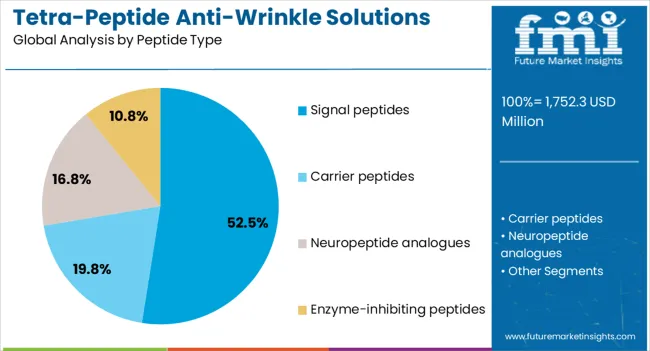
Signal peptides are projected to represent 52.5% of tetra-peptide formulation demand in 2025. Their dominance stems from their highly specific mechanism of action: communicating directly with skin cells to trigger regenerative pathways and stimulate collagen and elastin synthesis. This targeted activity positions signal peptides as one of the most effective peptide classes for anti-aging applications. Continuous advancements in peptide engineering and delivery technologies are further enhancing their potency, stability, and absorption into the skin.
Consumer sophistication is also rising, with ingredient-savvy shoppers increasingly seeking formulations that feature clinically proven actives like signal peptides. Premium brands frequently highlight the inclusion of signal peptides in marketing campaigns, emphasizing their science-backed mechanisms of action. With strong scientific credibility and high consumer demand, the signal peptides segment is set to maintain its leadership within the tetra-peptide category.
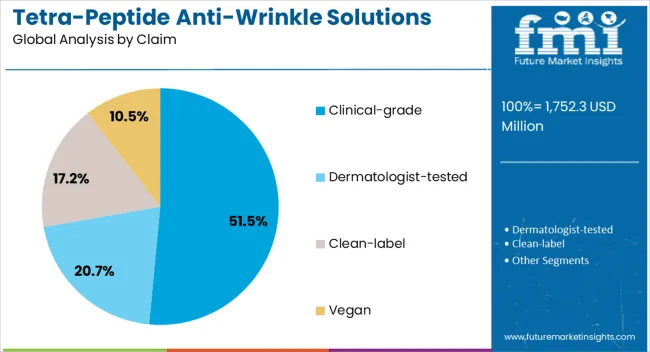
The clinical-grade claim is forecasted to hold 51.5% of the tetra-peptide anti-wrinkle solutions market in 2025. This dominance reflects increasing consumer demand for professional-level skincare solutions that deliver measurable, evidence-backed results. Clinical-grade formulations typically feature higher concentrations of tetra-peptides, often combined with advanced encapsulation or delivery systems to maximize efficacy while minimizing irritation. Dermatologist recommendations and clinical testing provide credibility, addressing consumer concerns about performance and safety.
Buyers are increasingly willing to invest in premium products that offer scientifically validated outcomes, particularly in the anti-aging category where results drive repeat purchases. The segment also benefits from the rising influence of medical spas, dermocosmetic lines, and premium e-commerce platforms promoting clinically tested solutions. With trust and performance at the forefront of purchase decisions, clinical-grade tetra-peptide formulations are positioned as the benchmark for efficacy and innovation in anti-aging skincare.
The tetra-peptide anti-wrinkle solutions market is advancing rapidly due to increasing consumer sophistication about skincare ingredients and growing demand for scientifically-backed anti-aging solutions. However, the market faces challenges including high raw material costs, complex formulation requirements, and varying regulatory standards across different regions. Innovation in peptide synthesis and delivery technologies continues to influence product development and market expansion patterns.
The growing trend toward personalized skincare is driving development of customized peptide formulations based on individual skin analysis and aging patterns. Advanced diagnostic tools and AI-powered skin assessment technologies enable brands to recommend specific peptide combinations for optimal results. Personalized formulations provide enhanced efficacy and customer satisfaction while supporting premium pricing strategies and brand differentiation.
Modern skincare brands are incorporating advanced delivery systems including liposomes, nanosomes, and peptide encapsulation technologies that improve peptide stability and skin penetration. These innovations enable higher bioavailability of active ingredients and enhanced treatment efficacy. Advanced delivery systems also support development of time-release formulations and targeted peptide delivery to specific skin layers.
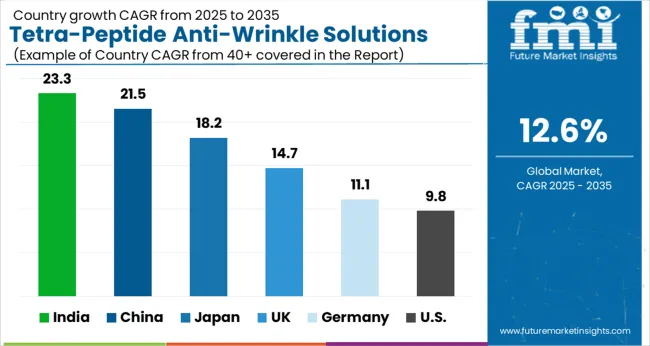
| Country | CAGR (2025 to 2035) |
|---|---|
| India | 23.3% |
| USA | 9.8% |
| China | 21.5% |
| Japan | 18.2% |
| UK | 14.7% |
| Germany | 11.1% |
The tetra-peptide anti-wrinkle solutions market is experiencing dynamic growth globally, with India leading at a 23.3% CAGR through 2035, driven by rapidly expanding beauty consciousness, increasing disposable income, and growing adoption of premium skincare products among younger demographics. China follows closely at 21.5%, supported by strong e-commerce growth, beauty influencer culture, and government support for cosmetic industry development. Japan demonstrates solid growth at 18.2%, emphasizing technological innovation, premium formulations, and consumer preference for scientifically-advanced skincare solutions. The UK shows steady expansion at 14.7%, focusing on clean beauty trends and dermatologist-recommended products. Germany records 11.1% growth, prioritizing clinical-grade formulations and sustainability initiatives.
The report covers an in-depth analysis of 40+ countries; six top-performing countries are highlighted below.
Revenue from tetra-peptide anti-wrinkle solutions in India is projected to exhibit the highest growth rate with a CAGR of 23.3% through 2035, driven by rapid urbanization, increasing beauty awareness, and growing influence of social media beauty trends. The country's expanding middle class and rising disposable income are creating significant demand for premium skincare products. Major international and domestic beauty brands are establishing comprehensive distribution networks to capture the growing market opportunity across urban and semi-urban areas.
Revenue from tetra-peptide anti-wrinkle solutions in China is expanding at a CAGR of 21.5%, supported by robust e-commerce infrastructure, growing beauty influencer culture, and increasing consumer sophistication about skincare ingredients. The country's advanced digital ecosystem and social commerce platforms are driving product discovery and purchase decisions. Live-streaming beauty content and KOL (Key Opinion Leader) recommendations are significantly influencing consumer preferences toward scientifically-proven peptide formulations.
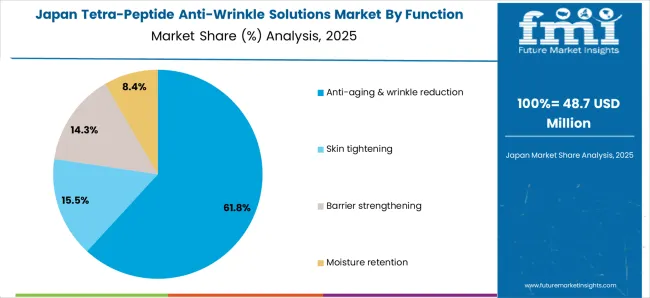
Revenue from tetra-peptide anti-wrinkle solutions in Japan is growing at a CAGR of 18.2%, driven by consumer preference for technologically advanced skincare solutions and willingness to invest in premium formulations. The country's sophisticated beauty market demands high-quality ingredients with proven efficacy and innovative delivery systems. Japanese consumers show strong loyalty to brands that demonstrate continuous innovation and scientific advancement in peptide technology.
Demand for tetra-peptide anti-wrinkle solutions in the UK is projected to grow at a CAGR of 14.7%, supported by increasing focus on clean beauty formulations and growing influence of dermatologist recommendations. British consumers are increasingly seeking products with transparent ingredient lists and clinically-proven benefits. The market is characterized by preference for sustainable packaging, ethical sourcing, and cruelty-free formulations that align with evolving consumer values.
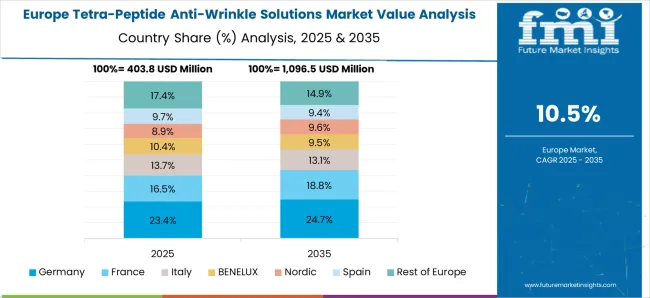
Demand for tetra-peptide anti-wrinkle solutions in Germany is expanding at a CAGR of 11.1%, driven by consumer preference for clinical-grade formulations and emphasis on sustainable beauty practices. German consumers prioritize products with scientific validation and prefer brands that demonstrate environmental consciousness. The market benefits from strong pharmacy channel distribution and professional skincare consultation services that support informed product selection.
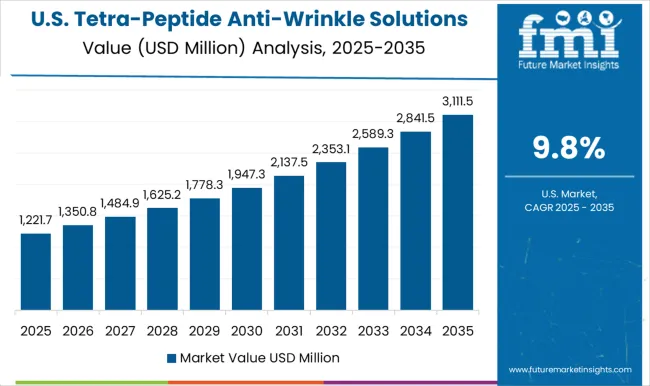
Demand for tetra-peptide anti-wrinkle solutions in the USA is expanding at a CAGR of 9.8%, driven by mature beauty market dynamics, strong professional skincare channels, and consumer willingness to invest in proven anti-aging solutions. Large beauty retailers and dermatology practices are establishing comprehensive peptide product offerings to serve diverse consumer needs. The market benefits from established beauty influencer culture and extensive product education resources that support informed purchasing decisions.
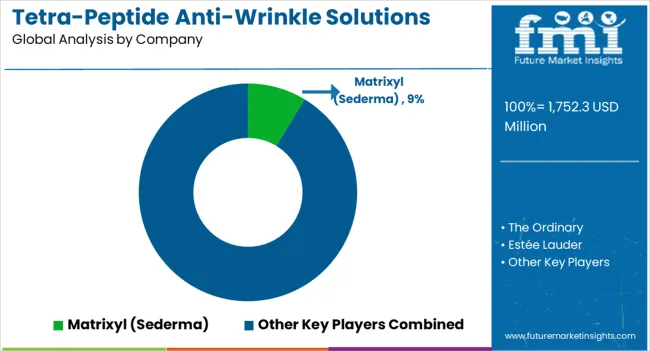
The tetra-peptide anti-wrinkle solutions market is defined by competition among established beauty conglomerates, specialized skincare brands, and innovative peptide technology companies. Companies are investing in advanced peptide research, sustainable formulations, personalized skincare solutions, and digital marketing strategies to deliver effective, accessible, and scientifically-proven anti-aging solutions. Strategic partnerships, clinical validation, and geographic expansion are central to strengthening product portfolios and market presence.
Matrixyl (Sederma), France-based, leads the market with 9% global value share, offering clinically-proven peptide ingredients and comprehensive technical support for beauty brands worldwide. The Ordinary, UK, provides accessible peptide formulations with transparent ingredient communication and direct-to-consumer distribution. Estée Lauder, USA, delivers premium peptide-infused skincare products with advanced delivery technologies and extensive retail presence.
SkinCeuticals, USA, emphasizes clinical-grade formulations with dermatologist partnerships and professional channel distribution. Olay, USA, offers mass-market peptide products with proven efficacy and broad consumer accessibility. Paula's Choice, USA, focuses on ingredient transparency and evidence-based formulations with direct-to-consumer education.
Shiseido, Japan, combines traditional beauty expertise with advanced peptide technology and premium positioning. Murad, USA, provides dermatologist-developed formulations with clinical validation and professional endorsement. Lancôme, France, delivers luxury peptide skincare with innovative textures and comprehensive anti-aging benefits. Drunk Elephant, USA, emphasizes clean formulations and compatible skincare ingredients for optimal peptide efficacy.
| Items | Values |
|---|---|
| Quantitative Units (2025) | USD 1,752.3 million |
| Function | Anti-aging & wrinkle reduction, Skin tightening, Barrier strengthening, Moisture retention |
| Peptide Type | Signal peptides, Carrier peptides, Neuropeptide analogues, Enzyme-inhibiting peptides |
| Product Type | Serums, Creams, Ampoules, Masks |
| Distribution Channel | E-commerce, Dermatology clinics, Pharmacies, Specialty beauty retail |
| Claim | Clinical-grade, Dermatologist-tested, Clean-label, Vegan |
| Regions Covered | North America, Europe, East Asia, South Asia & Pacific, Latin America, Middle East & Africa |
| Countries Covered | United States, Canada, United Kingdom, Germany, France, China, Japan, South Korea, India, Brazil, Australia and 40+ countries |
| Key Companies Profiled | Matrixyl (Sederma), The Ordinary, Estée Lauder, SkinCeuticals, Olay, Paula's Choice, Shiseido, Murad, Lancôme, and Drunk Elephant |
| Additional Attributes | Dollar sales by peptide sequence and delivery format, regional demand trends, competitive landscape, buyer preferences for serums versus creams, integration with clean-label/dermatologist-tested positioning, innovations in encapsulation, sustained release, and biomimetic peptide engineering |
The global tetra-peptide anti-wrinkle solutions market is estimated to be valued at USD 1,752.3 million in 2025.
The market size for the tetra-peptide anti-wrinkle solutions market is projected to reach USD 5,741.1 million by 2035.
The tetra-peptide anti-wrinkle solutions market is expected to grow at a 12.6% CAGR between 2025 and 2035.
The key product types in tetra-peptide anti-wrinkle solutions market are anti-aging & wrinkle reduction , skin tightening, barrier strengthening and moisture retention.
In terms of peptide type , signal peptides segment to command 52.5% share in the tetra-peptide anti-wrinkle solutions market in 2025.






Full Research Suite comprises of:
Market outlook & trends analysis
Interviews & case studies
Strategic recommendations
Vendor profiles & capabilities analysis
5-year forecasts
8 regions and 60+ country-level data splits
Market segment data splits
12 months of continuous data updates
DELIVERED AS:
PDF EXCEL ONLINE
5PL Solutions Market
mHealth Solutions Market Size and Share Forecast Outlook 2025 to 2035
Long Haul Solutions Market Size and Share Forecast Outlook 2025 to 2035
eClinical Solutions and Software Market Insights - Trends & Forecast 2025 to 2035
E-tailing Solutions Market Growth – Trends & Forecast 2020-2030
Connected Solutions for Oil & Gas Market Insights – Trends & Forecast 2020-2030
Biocontrol Solutions Market Size and Share Forecast Outlook 2025 to 2035
WealthTech Solutions Market Size and Share Forecast Outlook 2025 to 2035
Smart Home Solutions Market Size and Share Forecast Outlook 2025 to 2035
Payment Bank Solutions Market Size and Share Forecast Outlook 2025 to 2035
Aviation IoT Solutions Market
Eye Tracking Solutions Market
Hair Thinning Solutions Market Analysis - Size and Share Forecast Outlook 2025 to 2035
Hormonal Acne Solutions Market Analysis - Size and Share Forecast Outlook 2025 to 2035
Drug Delivery Solutions Market Insights - Growth & Forecast 2025 to 2035
Sensitive Skin Solutions Market Size and Share Forecast Outlook 2025 to 2035
Smart Building Solutions Market Size and Share Forecast Outlook 2025 to 2035
Acne Treatment Solutions Market Size and Share Forecast Outlook 2025 to 2035
Neuromarketing Solutions Market Size and Share Forecast Outlook 2025 to 2035
Cable Cleaning Solutions Market Analysis - Size, Share, and Forecast Outlook 2025 to 2035

Thank you!
You will receive an email from our Business Development Manager. Please be sure to check your SPAM/JUNK folder too.
Chat With
MaRIA